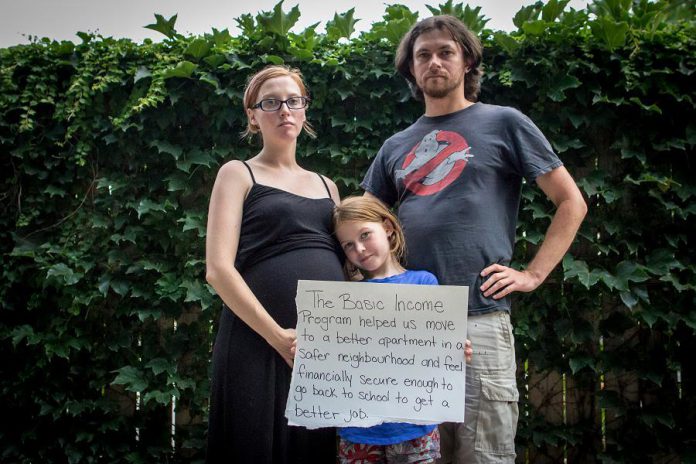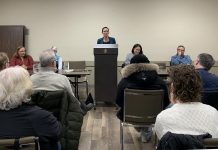
To address poverty and food insecurity, the Haliburton, Kawartha, Pine Ridge District Health Unit (HKPRDHU) is calling on the Canadian government to take action to provide a guaranteed basic income for residents in the health unit’s catchment area.
Up to 12.9 per cent of households in Haliburton County, 8.7 per cent of households in Northumberland County, and 10.2 per cent of households in the Kawartha Lakes live in poverty and struggle to pay for rent, bills, and healthy food, according to the health unit.
At its meeting on Thursday (September 19), the HKPRDHU board of health endorsed the health unit’s support for Bills S-233 and C-223 — “An Act to develop a national framework for a guaranteed livable basic income” — and approved that a letter, signed by HKPRDHU board chair David Marshall, be sent to the federal government on the topic of guaranteed basic income.
“The HKPRDHU has provided long-standing support for income-based solutions to reduce rates of poverty and household food insecurity,” the letter stated.
“The board of health for HKPRDHU supports upstream income-based solutions such as guaranteed livable basic income as essential components to effectively reduce poverty and household food insecurity.”
The letter noted the percentages of poverty in each of HKPRDHU’s areas.
“When families cannot afford to buy the food they want and need to maintain good health, they are food insecure. Food insecurity is a symptom of poverty.”
“The health consequences of food insecurity and poverty incur significant costs to Canada’s publicly funded healthcare system. Adults in food insecure households are more likely to be diagnosed with a wide range of chronic conditions, including mental health disorders, higher stress and anxiety, non-communicable diseases, and infections.”
According to the letter, research also shows that children and teens in “food insecure households” are more likely to have poorer health, develop chronic conditions like asthma, and develop mental health conditions such as depression, social anxiety, and suicidal thoughts.
Food insecurity also makes it difficult to self-manage conditions through diet, the letter noted.
“Research linking food insecurity data from population health surveys with administrative health records has provided strong evidence that food-insecure people are more likely to be hospitalized for a wide range of conditions, stay in hospital longer, more likely to be readmitted to hospital and die prematurely (before the age of 83) from all causes except cancer. Inadequate income and household food insecurity result in poor health outcomes and higher health care costs.”
During the meeting, the board of health discussed and endorsed correspondence from the Middlesex-London Health Unit urging the support of Bills S-233 and C-223. The two bills were introduced in December 2021 by Senator Kim Pate and MP Leah Gazan and are currently being considered by the Standing Senate Committee on National Finance and in the process of a second reading in the House of Commons.
In its briefing note for the board, HKPRDU’s health equity team said income-based solutions, such as a guaranteed livable basic income, are needed to address poverty, income insecurity, and household food insecurity and their significant impacts on health and well-being.
The briefing note described basic income guarantee as an unconditional cash transfer from the government to citizens to provide a minimum annual income, and is not tied to labour market participation.
“It is an essential component of a strategy to effectively eliminate poverty, ensure all Canadians have a sufficient income to meet their basic needs, and live with dignity and to eliminate health inequities.”
“Existing federal policies, such as Old Age Security (OAS) and Guaranteed Income Supplement (GIS) programs for seniors, and Canada Child Benefit (CCB) for parents,are forms of guaranteed income programs. These policies show evidence of positively addressing food insecurity and improving health outcomes.”
“In a cohort of low-income, single adults over 65 years receiving OAS/GIS, the risk of food insecurity reduced by 50 per cent compared to older adults aged 55 to 64 years not eligible for seniors’ pensions. Among families receiving CCB, the prevalence of severe food insecurity among low-income families with children decreased significantly compared to low-income families without children.”
According to the briefing note, “An Act to develop a national framework for a guaranteed livable basic income” is currently moving through the Senate (S-233) and the House of Commons (C-223). The bill requires “the Minister of Finance to develop a national framework for the implementation of a guaranteed livable basic income program throughout Canada for any person over the age of 17.”
In 2017, Lindsay was one of four cities selected to pilot Ontario’s basic income initiative. Launched under the former Liberal premier Kathleen Wynne’s government, the Ford government announced it was ending the pilot project shortly after being elected in 2018. When it was cancelled, almost 4,000 people were enrolled in the pilot program in Lindsay as well as Thunder Bay, Hamilton, Brantford, and Brant County.
In the summer of 2018, the HKPRDHU board wrote a letter to the premier urging for the reinstatement of the basic income pilot.
“The premature termination of that source of income left devastating effects on recipients, who had begun to improve their physical and mental health, labour market participation, food insecurity, housing stability, financial status and social relationships,” the briefing note stated.
During the September 19 meeting, the HKPRDHU board also asked that each member municipality also provide letters of support for Bills S-233 and C-223.


























